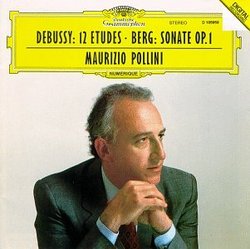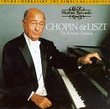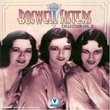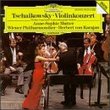| All Artists: Alban Berg, Claude Debussy, Maurizio Pollini Title: Debussy: 12 Etudes; Berg: Sonate Op. 1 Members Wishing: 0 Total Copies: 0 Label: Dg Imports Release Date: 2/15/1994 Album Type: Import Genre: Classical Styles: Forms & Genres, Etudes, Sonatas, Historical Periods, Modern, 20th, & 21st Century Number of Discs: 1 SwapaCD Credits: 1 UPC: 028942367821 |
Search - Alban Berg, Claude Debussy, Maurizio Pollini :: Debussy: 12 Etudes; Berg: Sonate Op. 1
 | Alban Berg, Claude Debussy, Maurizio Pollini Debussy: 12 Etudes; Berg: Sonate Op. 1 Genre: Classical
Pollini devotes four-fifths of this disc to the 12 etudes of Claude Debussy, and impressively done they are. The remaining piece, which predates the Debussy by a few years, is Alban Berg's powerfully compressed one-movemen... more » |
Larger Image |
CD DetailsSynopsis
Amazon.com essential recording Pollini devotes four-fifths of this disc to the 12 etudes of Claude Debussy, and impressively done they are. The remaining piece, which predates the Debussy by a few years, is Alban Berg's powerfully compressed one-movement Piano Sonata Op. 1--which already shows the 23-year-old composer's ability to reconcile the demands of form with the inherently volatile tendencies of an expressionistic musical idiom. Pollini's lean, rhythmically precise reading and hard, bright tone give the piece a remarkable intensity. The 1992 recording is direct and analytic, like the performance. --Ted Libbey Similar CDs
|
CD ReviewsBrilliant Performance of Two Revolutionary Works Michael A Pahre | Cambridge, MA | 05/22/2000 (5 out of 5 stars) "The set of etudes were the most revolutionary piano pieces Debussy ever wrote. They were written in the midst of many other revolutions in music, and stake claim for Debussy as one of the earliest modernists. Pollini treats these etudes as the wild, frenetic, flighty, brilliant, fanciful, and melodramatic gems that they are. He is totally confident with his technique, attacking every phrase with the assurance that he will not miss a note. The only criticism possible with Pollini's playing here is that he never gets the smoothed over, thin, glossy sound that many pianists prefer when playing Debussy. Despite this shortcoming, his playing is far more colorful than most. He brings out the avant-garde in the piece, rather than fixating on the technical aspects or any lingering impressionistic sounds.Pollini chose to pair the Debussy etudes with the Berg sonata, Op. 1, which was composed around the same time and is equally revolutionary. This one movement sonata is cyclical in nature, and basically dwells on the elaborate development of a few motifs. Berg was notably influenced by the late sonatas of Scriabin---and probably by the Liszt B minor sonata. Here Pollini is even more in his territory: an intellectually demanding, 20th century composition that requires the utmost in musicianship to carry off successfully.This is a great recording by one of the top pianists of our day. It is rare to hear such deeply intelligent musicianship, brilliant pianism, and interesting programming. Whether you prefer Pollini's performance of the Debussy etudes, or Uchida or Ohlsson, is probably more a matter of personal taste than anything else." Blazingly bright scarecrow | Chicago, Illinois United States | 04/10/2005 (5 out of 5 stars) "The relevance of Debussy's "Etudes" and the dimension that seems to attract most important pianists is that they were the last statement of "diatonic" music, Debussy knew something was in the air of dodecaphonic 12 Tone thinking but he really had no way, no pathway into utilizing it or developing it. So we have these 12 elegantly rendered "etudes", the genre of "Etude" has found great vigour in recent history with Cage's " Etudes Australes", and Gyorgy Ligeti"Two Books". This Debussy neither looks backwards nor frontways, these are pieces that sum up his life, with a refined sense of complex structure, where these "etudes" reiterate materials only at great expense to the content of the music. They do develop the"etude" as finger study to its utmost as the last one on"oppositions", it is incredibly difficult to keep incessantly throwing yours hands in opposite directions, it is more a physical feet than intellectual. Pollini brings his sensitivity to the modern, all the modernist repertoire he enjoys playing finds itself here,his concept then is that Debussy looked forwards with technical innovation. The"etude" genre seems quite suited to this agenda in that there is not much one can do within the "diatonic" system as well as not really engaging in "tonality" long past the post-romantics, so the "materials" then are texture,timbre,register,density and placement,juxtaposing your materials as you proceed, linear development a richer one, in that the ideas reiterate themselves over time, small segments of time, for Debussy knew that each "etude" could only inhabit a small durational frame to be effective.The "diatonic" ideas here for etude "spends" themselves very quickly, and in most he introduces secondary ideas, some never to return.The "lightness" of touch was also Debussy way, and another favorite is the repeated=note etude. If you have ever heard actual recordings of Debussy at the piano, he had a very light timbral piano. My favorite is the "chromatic" etude, where you have find delicate moving "smears" of lines moving crossing, overlapping each other. The "Fourths" as well almost sounds like a Japanese folk song, has a "mystery" about it, the "First Etude",is a skewed tribute actual sarcasm here to the school of Czerny,and the finger dexterity of vacuous contemplation, still the fingers need to move fast continusously, perhaps some music content would help, as well. I prefer Uchida's interpretations,she brings a little more passion than Pollini's blazingly bright resonance, not overbearing,simply bright. The Berg Sonata here as well, is a work really overplayed,and it really is not that fascinating a piece,it really does nothing new nor innovative for piano timbre as Webern(his latter "Variations") and Schoenberg(Opus 11, or the "Five Pieces" had done. Hanns Eisler's(the unacknowledged Schoenberg student) "First Sonata", is indeed more interesting." Pollini the Great Wayne Choma | Winnipeg, Canada | 02/07/2007 (5 out of 5 stars) "Not since Charles Rosen's superlative interpretation of this great piano masterwork has someone come along to stand beside him. Dedicated to Chopin, these two books of etudes reveal Debussy's own personal profound lifetime summation of keyboard revelations. This is one of the keystones of 20th century piano masterpieces and displays Debussy's great genius for all to hear. I am aware also why so many fine pianists have shunned this work, for it requires not only the widest virtuoso technical ability with the deepest musical insight to perform these pieces not as mere piano exercises but as the great music it is. For this can be clearly seen as even this musical work eluded the great Walter Gieseking who played it only passing well. Only with Charles Rosen's arrival did this work finally find its spiritual soulmate. I eagerly await Zoltan Kocsis long promised version but Rosen and Pollini are the two greatest interpreters of this masterwork. Perhaps someday, Charles Rosen's great interpretation will make its way onto compact disc - it is long overdue!"
|

 Track Listings (13) - Disc #1
Track Listings (13) - Disc #1


